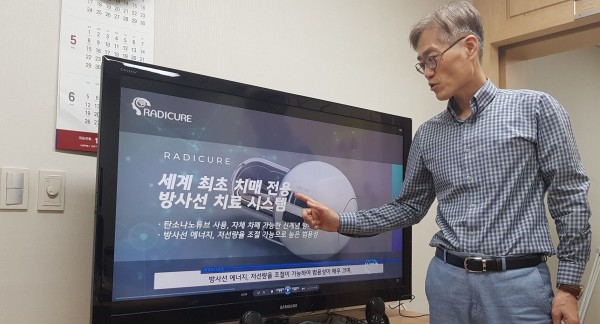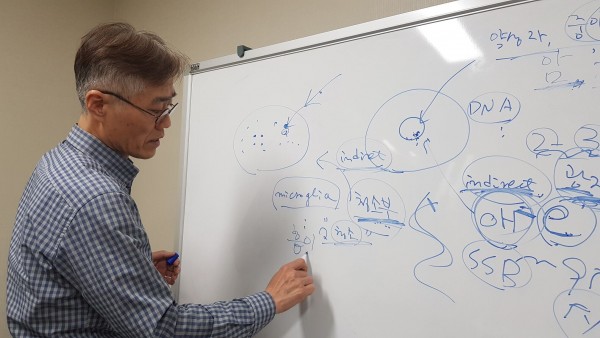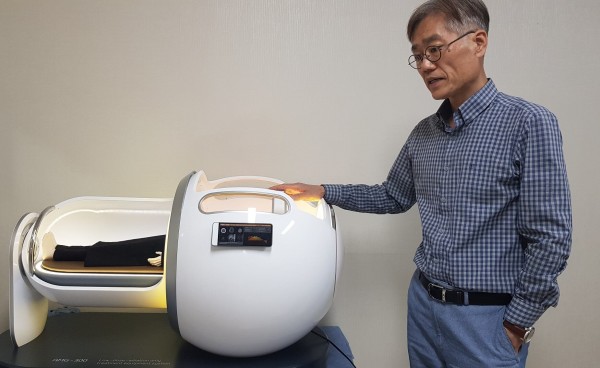[Doctors in Venture] ReadyCure CEO Weon Kuu Chung: "Conquering De…
페이지 정보

본문
Weon Kuu Chung, CEO of ReadyCure: "Conquering Dementia through Radiation Therapy ...
Improving Memory and Learning Ability"
Currently working at the Department of Radiation Oncology at Kyung Hee University Hospital in Gangdong,
CEO Chung founded his company after confirming the potential of treating dementia through his specialty, radiation.
Radiation activates 'microglia,' the "cleaners" in the brain, offering potential for symptom relief,
including improvements in memory and learning ability.
“My goal is to conquer dementia through low-dose radiation therapy.”
Weon Kuu Chung, professor in the Department of Radiation Oncology at Kyung Hee University Hospital
in Gangdong and CEO of ReadyCure, was handed a research paper in 2016 by a fellow professor whose mother had dementia.
Reflecting on that moment, Chung said, “My colleague was reading the paper and told me
that initially, he thought of his mother, a dementia patient, and then my face came to mind."
The paper detailed an experiment conducted at Julian Vermont Hospital in the U.S. involving mice
with dementia. The research team irradiated only half of the brain in these mice, leaving the other half
untreated, then compared the two regions. In the irradiated side, abnormal proteins causing dementia,
such as beta-amyloid and tau, were noticeably reduced.
After reading the paper, Chung felt a surge of excitement at the thought, "Could radiation therapy
treat not only cancer but also dementia?" Driven by a desire to verify this, he submitted a research
proposal to the National Research Foundation of Korea, secured research funding, and began experiments immediately.
Chung used "low-dose radiation," a level weaker than what Julian Vermont Hospital applied, on the brains of
mice with dementia. The results went beyond just the disappearance of abnormal proteins causing dementia;
the mice’s deteriorated learning ability also partially recovered. Subsequently, Chung’s research method was used in
radiation therapy for actual dementia patients at Chungbuk National University Hospital.
As a result, cognitive function improvements were observed in two out of every three participants,
proving effectiveness in treating human dementia.
Through further research, Chung discovered that radiation helps activate "microglia," immune cells in the brain.
Microglia are known as the "cleaners" of the brain, removing abnormal proteins that
cause dementia and maintaining cognitive function.
When excessive abnormal proteins accumulate, however, microglia enter an "overactive state,"
attacking not only abnormal proteins but also healthy neurons, further deteriorating cognitive function and worsening dementia.
Low-dose radiation passing through the brain gradually restores overactive microglia to their balanced state,
allowing them to function correctly. They selectively remove abnormal proteins accumulated in the brain and
improve deteriorated cognitive function. When the microglia in a dementia patient's brain are not overactivated and
maintain balance, dementia symptoms can be alleviated.
Based on these findings, Chung founded ReadyCure in September last year, successfully securing a 700 million KRW
investment within six months. Currently, Chung's radiation-based dementia treatment technology is undergoing
clinical trials at Kyung Hee University Hospital, Chungbuk National University Hospital, and Boramae Hospital.
The company is dedicated to developing the "AMG-300," a radiation dementia treatment device, aiming to
have it available for clinical use in 2025. Their goal is to "conquer dementia." I met with Weon Kuu Chung in
his office at the Department of Radiation Oncology, Kyung Hee University Hospital, in Sangil-dong,
Gangdong District, Seoul, on the 6th.
Please explain dementia as a disease.
“Dementia is a disease caused by the accumulation of foreign substances in the brain that prevent
proper signal transmission between brain cells, or by these substances clumping and adhering to the brain,
leading to cell destruction. Autopsies of dementia patients reveal proteins like beta-amyloid and tau in the brain,
which are ‘abnormal proteins’ formed during the process of repeated breakdown and creation of normal
proteins in the brain’s cell membrane. These accumulate like foreign substances."
I heard the number of dementia patients is increasing.
“That’s inevitable, as there is no cure despite knowing the cause. Medications like Donepezil exist,
but they only slow the progression without improving lost cognitive function.
That’s why it’s called an ‘irreversible degenerative disease,’ meaning it can’t be reversed.
Additionally, with increasing life expectancy and more elderly individuals, the number of
patients is rising rapidly. Dementia incidence among those over 65 is between 5-10%, and worldwide,
a new dementia patient emerges every seven seconds. It’s estimated that by 2030, there will be
1.14 million dementia patients in Korea.”
Your field, radiation oncology, doesn’t seem related to dementia.
“That’s true; I’m a specialist in treating cancer with radiation, not dementia. However,
I decided to establish ReadyCure after reading a paper in 2016. It described how,
in an experiment at Julian Vermont Hospital, abnormal proteins were significantly reduced only
in the irradiated part of the brains of mice with dementia, while the other side was left untreated.
A colleague whose mother has dementia introduced me to the paper, saying he thought of his mother
and then of me. As I read, my heart raced because I could see the potential for my medical expertise
to help treat dementia, a disease humanity has struggled with for ages.”
You encountered the paper in 2016, but the company was founded in 2021. What happened in between?
“First, I had to verify the findings. I submitted a research plan to the National Research Foundation of Korea,
lowering the radiation dose used by Julian Vermont Hospital. I wanted to see if ‘low-dose radiation’ could
also reduce abnormal proteins in the brain associated with dementia. The results were successful;
abnormal proteins in the brains of mice with dementia disappeared to a significant extent.
Furthermore, after radiation therapy, the mice’s cognitive functions also improved. Following this,
Chungbuk National University Hospital conducted similar research on actual dementia patients
instead of mice. Approximately 70% of the patients showed cognitive improvement, confirming
that dementia symptoms could be alleviated through radiation therapy.”
What is the principle behind it? Does simply removing abnormal proteins with radiation relieve dementia?
“At first, I thought so, but I wasn’t certain, so I conducted additional experiments.
After five days of radiation treatment on mice with dementia, we compared brain states four days
and eight weeks after treatment. Four days after radiation, the abnormal proteins were still present.
However, eight weeks later, the abnormal proteins had mostly disappeared. Radiation wasn’t
physically removing abnormal proteins."
Then, what exactly is the process through which dementia symptoms improve?
"Our research shows that the key is ‘microglia.’ Microglia are commonly referred to as the
‘cleaners of the brain.’ They remove waste in the brain, including abnormal proteins,
and maintain cognitive function. Microglia differentiate into M1 or M2 depending on the situation.
M1 removes waste, while M2 manages cognitive function. In a healthy brain, they maintain a
balanced ratio of around 50:50. However, when excessive abnormal proteins like beta-amyloid
and tau accumulate, M1 proliferates, disrupting this balance. In this ‘overactive state,’ M1
attacks both abnormal proteins and functioning neurons. When radiation is applied, the balance between
M1 and M2 is gradually restored, allowing microglia to function properly.
M1 selectively removes abnormal proteins, and M2 gradually restores learning and memory abilities.
Dementia symptoms improve through this process, an achievement uncovered through years of research."
Did you start the company immediately after understanding the role of microglia?
“No. Initially, I considered using equipment intended for radiation cancer therapy to treat dementia,
with no thoughts of starting a business. However, cancer radiation equipment is very expensive,
costing around 10 billion KRW each, so it’s not feasible to have multiple units.
Also, we have numerous cancer patients, with around 250,000 new cases each year.
Sharing cancer treatment equipment between cancer and dementia patients would be difficult.
Yet, it felt wasteful to abandon the methodology I’d spent years developing.
Eventually, I decided it would be best for the doctor to create the equipment for use, so I founded the company.”
Your company is relatively new. Has it achieved any business success?
“The company was founded in September last year, and we secured 700 million KRW
in angel investment this April. We also applied for a government project, ‘Bio Medical Technology
Commercialization,’ which, if accepted, would provide an additional 530 million KRW in funding.
We have patented our low-dose radiation therapy methodology, and clinical trials for low-dose
radiation dementia treatment are underway at Chungbuk National University Hospital,
Boramae Hospital, and Kyung Hee University Hospital.”
Please explain the treatment device you are developing.
“We are developing the AMG-300, a low-dose radiation dementia treatment device.
When the patient lies inside, radiation enters from multiple angles. The operating methodology
of this device is patented. We are currently creating the blueprint for the physical device.
We plan to release the device by 2025, obtain approval from the Ministry of Food and Drug Safety,
and use it to treat dementia patients in hospitals.”
Do you have any long-term goals?
“My goal is to establish low-dose radiation therapy as the standard treatment for dementia.
Currently, no existing dementia-related drugs can completely halt and improve cognitive decline.
Donepezil only slows dementia progression, while aducanumab, which received FDA
approval last year, is even being criticized for its lack of effectiveness.
I want to change the narrative and overcome dementia.”
- 이전글[After the Rain Medical Channel] What Role Could Radiation Therapy Play in Alzheimer's Disease? 24.11.06
- 다음글[Innovative Startup in Hongneung] ReadyCure: "Pioneering a New Era with a Low-Dose Radiation Therapy System Specialized for Dementia" 24.11.05
댓글목록
등록된 댓글이 없습니다.




